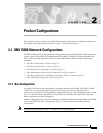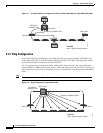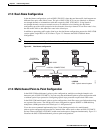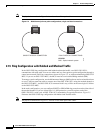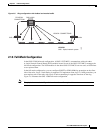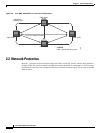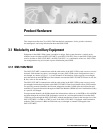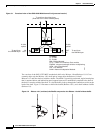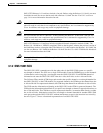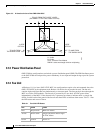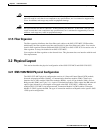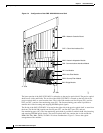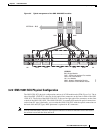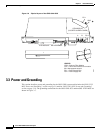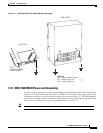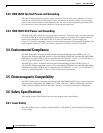
3-3
Cisco ONS 15200 Product Description
78-13766-01
Chapter 3 Product Hardware
Modularity and Ancillary Equipment
ONS 15252 Releases 1.0.1 and later include a fan unit. Before using the Release 1.0.1 shelf, you must
install the fan unit. Do not use the fan unit with a Release 1.0 shelf. See the “Fan Unit” section on
page 3-4 for more information about the fan unit.
Caution You must install the fan unit in a Release 1.0.1 shelf. Running the Release 1.0.1 shelf without the fan
unit will result in a unit that is not compliant to any specifications, nor is warranted or supported by
Cisco. In addition, such usage may result in equipment damage.
Caution Do not install the fan unit in a Release 1.0 shelf. Running the Release 1.0 shelf with a fan unit will
result in a unit that is not compliant to any specifications, nor is warranted or supported by Cisco. In
addition, such usage may result in equipment damage.
ONS 15252 Releases 1.0.1and later include an updated Network Adaptation module (NAM). The
Release 1.0.1 NAM has a “NEBS-3 compliant” label on the faceplate, whereas the previous version of
the NAM does not have a faceplate label. The Release 1.0.1 shelf requires the Release 1.0.1 NAM. You
can also use Release 1.0.1 NAMs in the Release 1.0 shelf. See the Cisco ONS 15200 Module Handbook
for more information about the NAM.
Caution Placing NAMs without the “NEBS-3 compliant” label into an Release 1.0.1 shelf may result in
equipment damage.
3.1.2 ONS 15201 SCU
The ONS 15201 SCU communicates with the other nodes in the ONS 15200 system on a specific
wavelength or channel. The SCU uses a single CLIP module. From the DWDM layer, several channels
of information, each occupying a wavelength, enter the ONS 15201 SCU. Each DWDM channel of
information can enter the ONS 15201 SCU from the A side, the B side, or the A side and B side.
The Collector Filter module (CFM) drops and transfers the specific channel or wavelength intended for
the ONS 15201 SCU to the CLIP module. For protected channels, the CFM drops the channel from the
A side and B side. For unprotected channels, the CFM drops the channel from either the A side or B side.
The CLIP transfers information originating at the ONS 15201 to the CFM for protected channels. The
CFM splits the information and transmits it at a specific wavelength or channel in opposite directions on
the A side and B side. The CFM does not split unprotected channels; it transmits them directly to either
the A side or B side. Information carried on a wavelength or channel intended for another ONS 15200
node passes through the ONS 15201 SCU without interference except for the insertion loss caused by
the unit. Figure 3-3 shows a functional representation of an ONS 15201 SCU.



